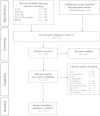The evolution of health literacy assessment tools: a systematic review
- PMID: 25418011
- PMCID: PMC4289240
- DOI: 10.1186/1471-2458-14-1207
The evolution of health literacy assessment tools: a systematic review
Abstract
Background: Health literacy (HL) is seen as an increasingly relevant issue for global public health and requires a reliable and comprehensive operationalization. By now, there is limited evidence on how the development of tools measuring HL proceeded in recent years and if scholars considered existing methodological guidance when developing an instrument.
Methods: We performed a systematic review of generic measurement tools developed to assess HL by searching PubMed, ERIC, CINAHL and Web of Knowledge (2009 forward). Two reviewers independently reviewed abstracts/ full text articles for inclusion according to predefined criteria. Additionally we conducted a reporting quality appraisal according to the survey reporting guideline SURGE.
Results: We identified 17 articles reporting on the development and validation of 17 instruments measuring health literacy. More than two thirds of all instruments are based on a multidimensional construct of health literacy. Moreover, there is a trend towards a mixed measurement (self-report and direct test) of health literacy with 41% of instruments applying it, though results strongly indicate a weakness of coherence between the underlying constructs measured. Overall, almost every third instrument is based on assessment formats modeled on already existing functional literacy screeners such as the REALM or the TOFHLA and 30% of the included articles do not report on significant reporting features specified in the SURGE guideline.
Conclusions: Scholars recently developing instruments that measure health literacy mainly comply with recommendations of the academic circle by applying multidimensional constructs and mixing up measurement approaches to capture health literacy comprehensively. Nonetheless, there is still a dependence on assessment formats, rooted in functional literacy measurement contradicting the widespread call for new instruments. All things considered, there is no clear "consensus" on HL measurement but a convergence to more comprehensive tools. Giving attention to this finding can help to offer direction towards the development of comparable and reliable health literacy assessment tools that effectively respond to the informational needs of populations.
Figures
References
-
- European Innovation Partnership on Active and Healthy Ageing . Action plan on prevention and early diagnosis of frailty and functional decline, both physical and cognitive, in older people. 2012.
Pre-publication history
-
- The pre-publication history for this paper can be accessed here: http://www.biomedcentral.com/1471-2458/14/1207/prepub
Publication types
MeSH terms
LinkOut - more resources
Full Text Sources
Other Literature Sources
Medical
Miscellaneous


